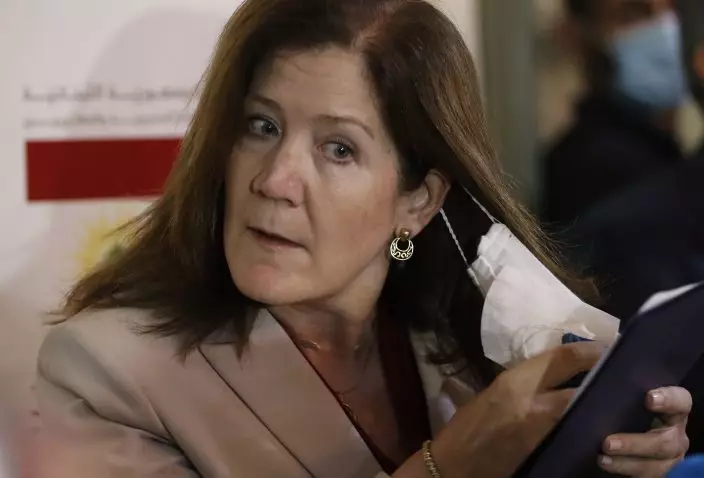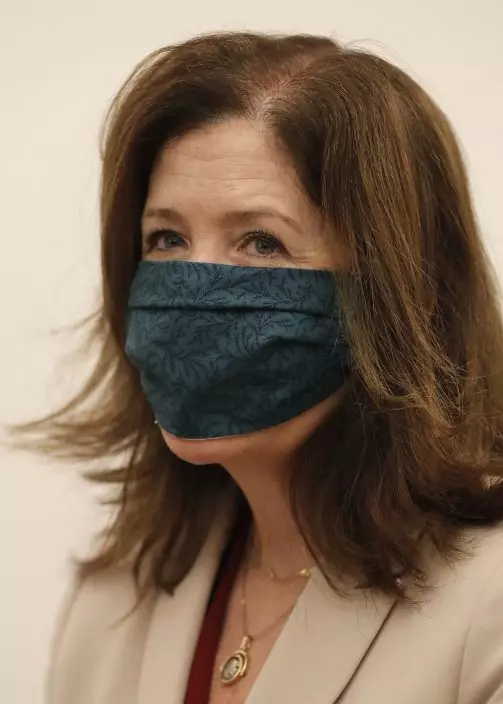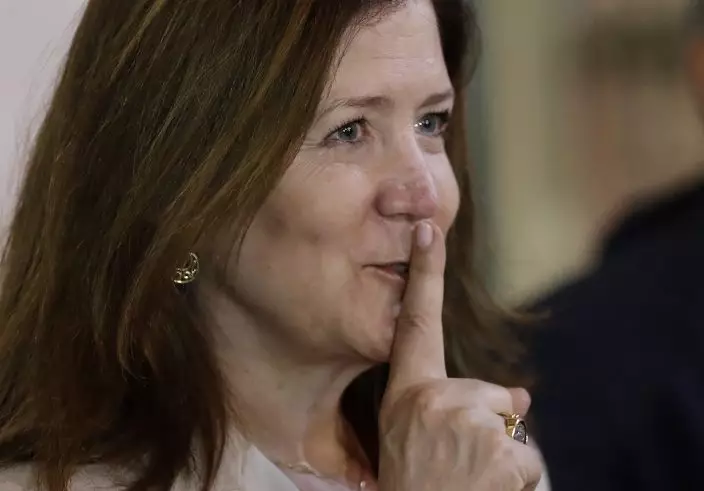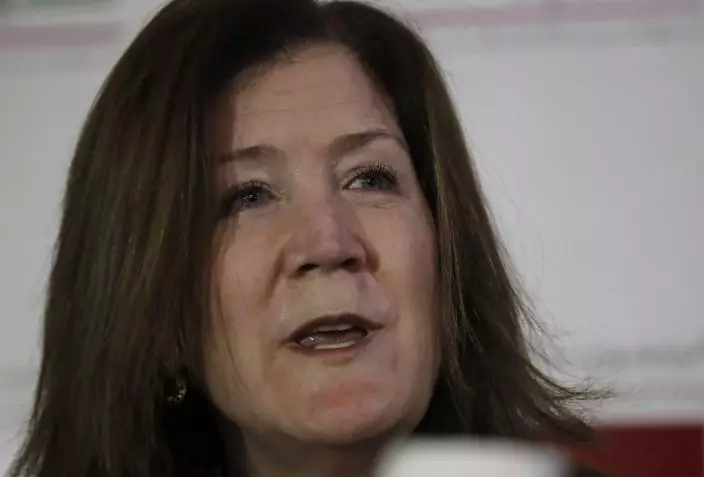The U.S. ambassador to Lebanon said Monday after meeting the country’s foreign minister that they have “turned the page” over a court ruling issued over the weekend barring local and foreign media from interviewing the envoy over her comments regarding Hezbollah.
A judge had ordered the year-long ban after U.S. Ambassador Dorothy Shea told Saudi-owned TV station Al-Hadath that Washington has “great concerns” over the Iran-backed militant group's role in the government.
She said Lebanon is reeling from years of corruption of successive governments and accused Hezbollah of siphoning off government funds for its own purposes and of obstructing needed economic reforms.

U.S. Ambassador to Lebanon Dorothy Shea, takes off her face mask as she prepares to make a statement following her meeting with Lebanese Foreign Minister Nassif Hitti, in Beirut, Lebanon, Monday, June 29, 2020. Hitti and Shea discussed a court ruling issued over the weekend in which a Lebanese judge banned local and foreign media outlets in the country from interviewing the ambassador for a year over comments she made regarding the powerful Hezbollah group. (AP PhotoHussein Malla)
Critics viewed her comments as foreign interference in Lebanese affairs, but the judge's ruling was also harshly criticized by many in Lebanon, where the media enjoys far more freedom than in many other Arab states.
On Monday, Shea read a brief statement in which she said that her meeting with Foreign Minister Nassif Hitti was “positive.”
“We turned the page on this unfortunate distraction so we can all focus on the real crisis at hand, which is the deteriorating economic situation in Lebanon,” she said.

U.S. Ambassador to Lebanon Dorothy Shea, wears a mask to help curb the spread of the coronavirus, during her meeting with Lebanese Foreign Minister Nassif Hitti, in Beirut, Lebanon, Monday, June 29, 2020. Hitti and Shea discussed a court ruling issued over the weekend in which a Lebanese judge banned local and foreign media outlets in the country from interviewing the ambassador for a year over comments she made regarding the powerful Hezbollah group. (AP PhotoHussein Malla)
A few protesters held a sit-in outside the Foreign Ministry during the meeting.
The court ruling remains in effect but appears unlikely to be enforced.
Lebanon, one of the most indebted countries in the world, is mired in its worst economic crisis in decades. It recently defaulted on its debt and has been negotiating with the International Monetary Fund for weeks with no breakthrough so far.

U.S. Ambassador to Lebanon Dorothy Shea, gestures after her meeting with Lebanese Foreign Minister Nassif Hitti, in Beirut, Lebanon, Monday, June 29, 2020. Hitti and Shea discussed a court ruling issued over the weekend in which a Lebanese judge banned local and foreign media outlets in the country from interviewing the ambassador for a year over comments she made regarding the powerful Hezbollah group. (AP PhotoHussein Malla)
The local currency lost more than 80% of its value against the U.S. dollar in recent months amid soaring prices and popular unrest.
The court decision by the Lebanese judge reflected the rising tension between the U.S. and Hezbollah, and revealed a widening rift among groups in Lebanon amid the crisis.
Shea said the U.S. stands ready and will continue to help the Lebanese people as the government takes the necessary steps to address the underlying causes of the crisis.

U.S. Ambassador to Lebanon Dorothy Shea, speaks to journalists after her meeting with Lebanese Foreign Minister Nassif Hitti, in Beirut, Lebanon, Monday, June 29, 2020. Hitti and Shea discussed a court ruling issued over the weekend in which a Lebanese judge banned local and foreign media outlets in the country from interviewing the ambassador for a year over comments she made regarding the powerful Hezbollah group. (AP PhotoHussein Malla)
State-run National News Agency quoted Hitti as saying during the meeting that freedom of the press and opinion are a “sacred right” in the country, which enjoys wider freedoms than many other Arab countries.
Hitti, who had summoned Shea to the meeting, also said that it is important that Beirut and Washington continue their cooperation in all fields to help Lebanon weather the crisis.
Hezbollah and its allies are dominant in parliament and back the current government. It is designated by Washington as a terrorist group and the U.S. has recently expanded sanctions against it.
However, Washington is one of the largest donors to the Lebanese army, making for one of the more complicated diplomatic balancing acts in the region.


